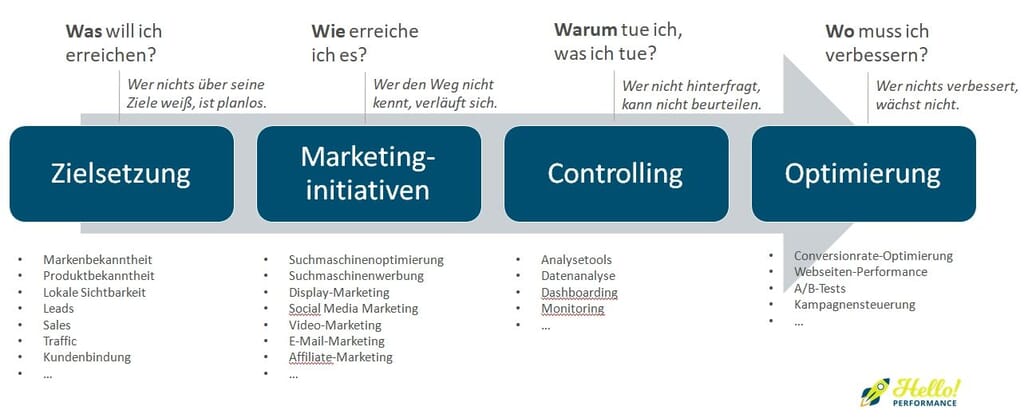
Performance Marketing? What does it actually mean, how does it differ from “normal” online marketing and is there a definition?
Contents:
- Definition: Performance Marketing
- The objective
- KPIs in performance marketing
- Performance Marketing Channels
- Controlling
- Optimization
- Advantages of Performance Marketing
- The Mindset
- For whom does performance marketing make sense?
The key message is in the name: PerformanceMarketing. The difference to classic marketing is therefore a strongly performance-orientedapproach.
Definition
One definition could read like this: Performance marketing prevents the economic blind flight and enables that every marketing measure can be checked, questioned and optimized at any time.
PM is not a “discipline” in its own right, but rather a strategy based on a particular attitude, a mindset. Why is that? Because the unconditional will to measure, evaluate and improve everything must be there in order to implement performance marketing.
Performance marketing consists of four areas that strategically build on each other:
- Objective: Whatdo I want to achieve?
- Marketing initiatives (channels): Howdo I reach it?
- Controlling: Whydo I do what I do?
- Optimization: Wheredo I need to improve?

To get a real basic understanding of what performance marketing is and the benefits behind it, let’s take a closer look at the different areas.
1. the objective
“If you don’t know anything about your goals, you’re haphazard.”
The first step in performance marketing is therefore to have a clear idea and knowledge of what we want to achieve. What are our goals (short-term and long-term)? Only when we know what we want can we figure out how to achieve it.
What are the goals now? It depends, of course: For online store operators, for example, the main goal will be to sell products. Hotel owners want to generate bookings through the website and speakers who stand on a stage and give lectures want to sell tickets.
In online marketing, we define goals in the form of performance indicators or KPIs (key performance indicators).
KPIs in performance marketing
In performance marketing, we combine different channels with each other. We also call these channels marketing initiatives. We look at each channel individually and assign its own KPis. However, there are also universally valid KPIs.
One possible categorization of performance metrics:
- Generally valid KPIs
- KPIs for search engine optimization (SEO)
- KPIs for search engine advertising (SEA)
- KPIs for social media marketing
- KPIs for email marketing
- Website-KPIs
There are, of course, more and this classification is only exemplary.diese Einordnung ist nur beispielhaft. For example, you could also subdivide by eCommerce and other channels.
Examples of generally applicable KPIs:
- Number of conversions
- Conversion Rate
- Cost-revenue ratio (CRR)
- Return on Investment (ROI)
- Return on Adspend (ROAS)
- CPA (Cost per Acquisition)
- CPO (Cost per Order)
Examples of SEO KPIs:
- Visibility index
- Keyword-Rankings
- Clicks on organic search results
- Impressions in organic search
Examples of SEA KPIs:
- CPC (cost per click)
- CPM (cost per 1,000 impressions)
- CPL (cost per lead)
- CTR (click-through rate)
Examples of social media KPIs:
- Subscribers
- Fans
- Follower
- coverage
- Growth
Examples of email KPIs:
- Opening rate
- Links clicks
- Number of subscribers
- Unsubscribes
Examples of website KPIs:
- User
- Page views
- Bounce rate
- Session duration
- New users
- Returning users
Which KPIs we define is individual and depends on the company’s goals.
2. marketing channels / marketing initiatives
“If you don’t know the way, you’ll get lost.”
Performance marketing is modular and strategically combines different channels or marketing initiatives. In doing so, we look in advance at which channel makes sense for achieving our goals in order to avoid wasted coverage. Which marketing channels make sense depends largely on the target group we want to reach and the current market situation. Therefore, it makes sense to additionally do a target group and competitor analysis, if not already done.
Examples of performance marketing channels:
- Search Engine Optimization
- Search engine advertising
- Social Media Marketing
- Video-Marketing
- Display-Marketing
- E-Mail-Marketing
- Affiliate-Marketing
- Own website
3. Controlling
“If you don’t question, you can’t judge.”
We control and scrutinize every single marketing channel and every marketing initiative in order to implement maximally efficient measures and avoid wastage.
So the first step is to implement a well-designed and consistent tracking concept on the website. The tracking setup is based on our KPIs, which we have defined beforehand. In general, we evaluate everything that is possible.
In doing so, we make use of tracking tools. Probably the most used and therefore best known tracking tool is Google Analytics. In addition, there are also, for example, Piwik/Matomo, Etracker or Econda and many more. We use the free Tag Manager from Google to implement the tracking. This offers many advantages, e.g. more flexibility and independence in implementation.
What cannot be measured, we refrain from in performance marketing or make it measurable.eit in the implementation.
4. Optimierung
“If you don’t improve, you don’t grow.”
Along with controlling, optimization is one of the factors that give our marketing the performance mindset. Only by continuously optimizing all channels and measures can we achieve the best possible performance and maximum efficiency.
In doing so, we check and evaluate performance against our KPIs so that we can then optimize them. Controlling and optimization are therefore the two areas that we deal with in performance marketing on an ongoing and deeper basis.
What are the benefits of performance marketing?
A major advantage over traditional marketing without a performance focus is the transparent costs and relatively low risk. Companies know exactly what they get for their money, because the performance basis is the basis for billing.
Through the continuous review of targets and KPIs, it is possible to react at short notice, campaigns do not have to go “to the end” to make decisions (success, failure).
Performance marketing is also very closely linked to the respective business goals and therefore contributes greatly to thegrowth of the company.
The Performance Marketing Mindset
“Mindset”? Right. Performance marketing is not just a strategy but an inner attitude and way of thinking. If you are not passionate about evaluating and constantly optimizing every step and every measure in the marketing mix, you are probably not having fun and will have a rather difficult time. Performance marketing has to be lived and loved, it is in us and accompanies us not only in our working life.
As a performance marketing agency, we live this mindset and attitude.
We
- put the user in the center
- put the focus on numbers and data
- never act on gut feeling alone
- see failures as opportunities
- deploy budgets and knowledge where it makes sense to do so
- Work together as a team in an agile and cross-functional manner
For whom does performance marketing make sense?
The question is rather: for whom does it not make sense? Are there any disadvantages at all?
Especially for start-upsand smaller companies, a transparent overview of costs is very important. Performance marketing is therefore very interesting and helpful for SMEs and start-ups due to the clear control of measures and campaigns and the ongoing review of profitability.
But large companies also benefit from optimally targeted marketing campaigns. Who likes to throw money out of the window blindly?
Performance marketing has one more excellent feature: we can do and implement it with small and big budget. And that makes it interesting for everyone.


